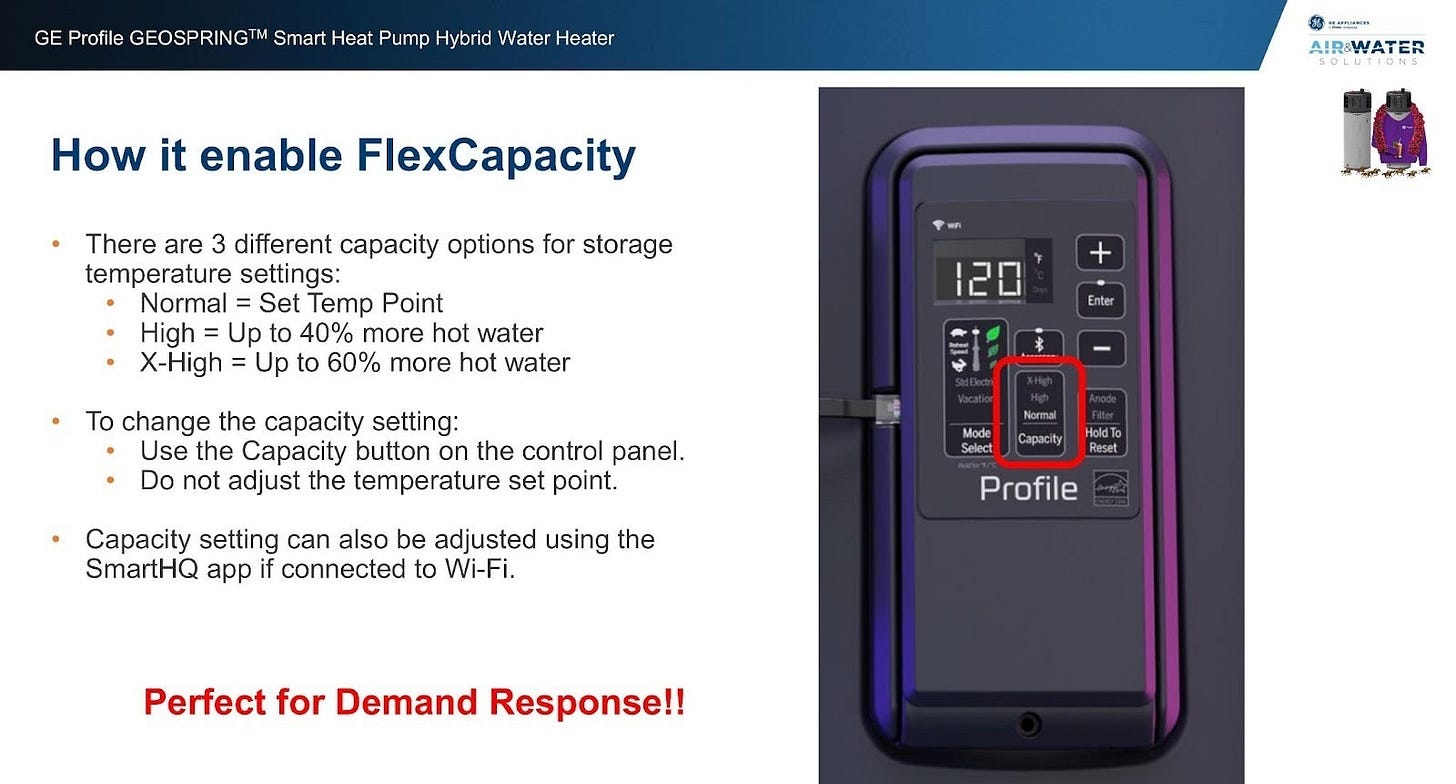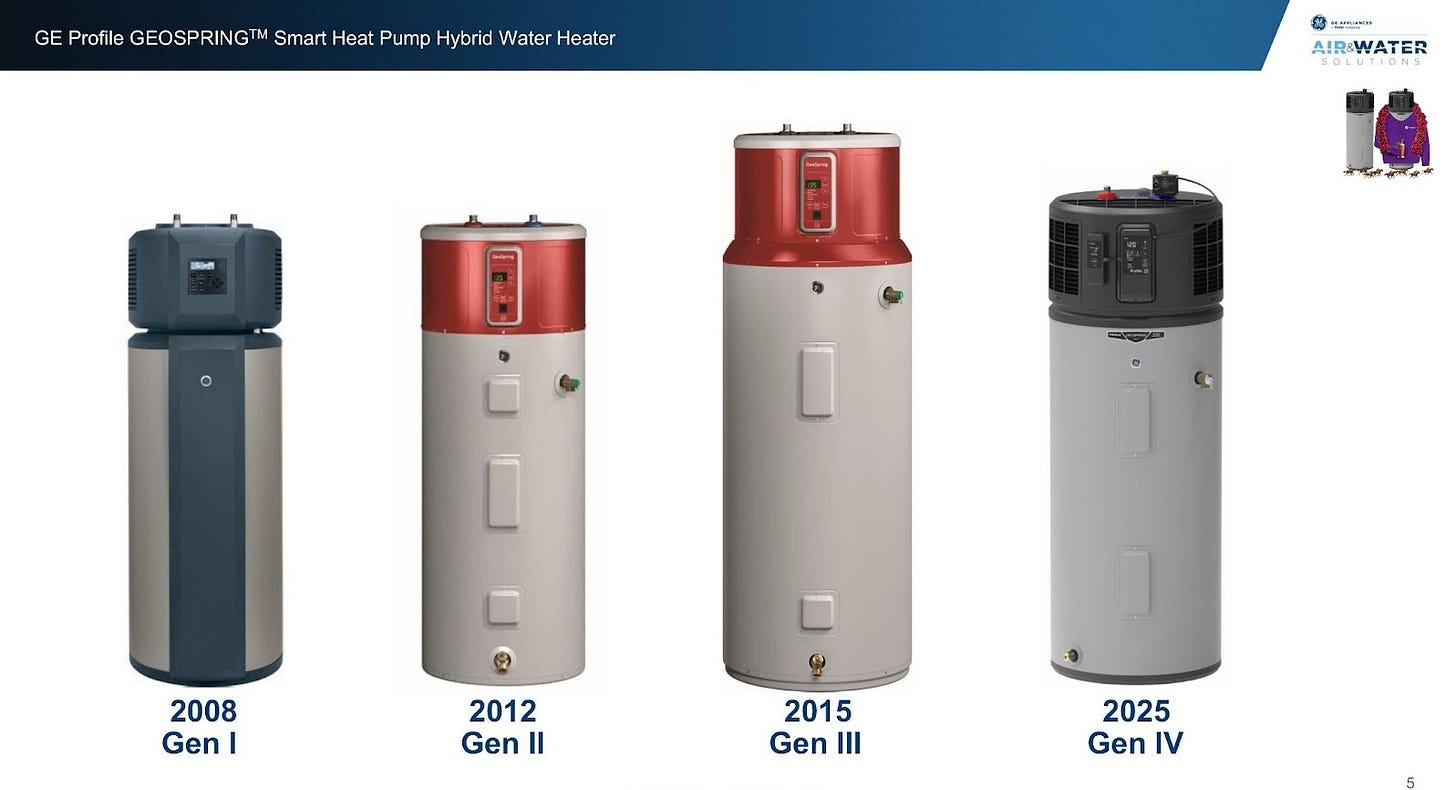General Electric (GE) is launching a brand new heat pump water heater (HPWH) that elevates the technology to a whole new level.
GE was one of the first to bring a HPWH to market in 2008. The company spent the last several years closely studying seemingly every technological challenge and pain point related to HPWHs and, this summer, they are bringing a product to market with innovations to answer nearly all of them.
History of GE and HPWHs
This is the fourth generation of heat pump water heater from GE, but the first we’ve seen in about a decade. GE got into the HPWH game right when they were first certified as ENERGY STAR products in 2009. In the early 2000s, ENERGY STAR had challenged manufacturers to build a HPWH for the US. At the time, HPWHs in the US were virtually nonexistent but were common in Europe and Asia.
GE answered the call and created the Geospring in 2008. For the next 7 years, GE improved upon that product and earned a reputation as a solid and efficient water heater manufacturer. But in 2015, GE sold its HPWH product and line to Bradford White and exited the heat pump business.

Over the past decade, as HPWHs have quadrupled in sales and seem poised to dominate the water heating market, GE has been thoughtful and patient in designing its next generation of HPWH and getting back into the game.
This deliberation and research have paid off big time.
Innovation, Innovation Everywhere
So much innovation, where do we start?
We spent an hour and a half talking to the company about all of its features for our new podcast Heat Pumps and Cardigans, and could have gone on longer.
Here are some of the top features:
240 and 120 volts in one unit!
GE is bringing to market the first heat pump water heater that is “convertible” or dual voltage. This means the water heater works on both 120 and 240 volts of electricity. Until now, manufacturers have brought separate products for each voltage.
The 240-volt HPWH is the standard, hard-wired model that works especially well for electric resistance water heater replacements (which already use 240V of electricity). 120-volt HPWHs have emerged as a good option for switching from gas water heaters that may only have a standard 120V plug nearby. GE’s Geospring does them both in one unit. If your gas water heater breaks and you’re in a rush to install a new one, you can install the Geospring and plug it into a standard 120-volt outlet to see if it meets your water heating needs. Later, you can run a 240-volt electrical wire and connect the water heater if you want more electrical juice and faster recovery times. This dual voltage is a key product feature that will make it easier for all types of households to ditch their ancient, polluting water heating technology and go with the heat pump.

It can heat water to an astounding 160°F.
The next significant innovation to mention is the integrated electronic mixing valve. Mixing valves allow you to store water at hotter temperatures as they mix cold water with hot to keep water temperatures at safe levels. Hotter water means more hot water, which is especially important with heat pumps because they recover more slowly in their most efficient modes. So if you can store water at hotter temperatures, you have fewer chances of running out of it.
To date, heat pump water heater manufacturers have only included mixing valves in their 120-volt plug-in units. GE is including an electronic mixing valve (found inside the water heater) on all of its products. This mixing valve can store water up to an incredible 160°, effectively turning a 50-gallon tank into an 80-gallon tank. With GE’s new product, the standard advice for upsizing your HPWH tank to provide more storage might need to be rethought, as might any worries about slow water heating recovery.

Low GWP refrigerant
GE’s new model also makes great advances in the refrigerant it uses. Up to now, virtually every water heater manufacturer has used the R134a refrigerant, which, if it escapes, can cause significant global warming pollution and reduce the climatic benefits of a heat pump water heater. GE’s new heat pump water heater uses 1234 YF, the same refrigerant used in modern car AC systems. This refrigerant has an incredibly low GWP. With this choice, GE has removed any global warming concerns associated with refrigerants.
Variable speed compressor
GE has also included a variable-speed compressor in its new heat pump water heater. LG is the only other HPWH manufacturer with a variable-speed compressor. The variable-speed compressor makes the Geospring the most efficient HPWH on the market, with some of the fastest recovery times. It also makes it extremely quiet at 41 decibels.

We could go on and on about the features of this product, but here are some key innovations:
- Leak Detection System: It has a very innovative leak detection system with a wireless leak sensor that can be placed anywhere in the home and warns the user if their water heater is leaking.
- Innovative App: The GE Geospring has some advanced connectivity features and an innovative app that can help you program your water heater and see how much energy it’s using.
- Electric Capacity Sharing: It can share a circuit with a car charger, thus allowing you to share your electrical capacity if you don’t have a very large electrical service.
- Ease-of-Serviceability: It is designed to be serviced so that installers won’t have to rip one out and replace it if something goes wrong,
GE’s Geospring is available now, and a quick scan of Internet prices shows that the product is priced at the low end of HPWH costs (around $2,000 before tax credits and rebates). It’s available to contractors and through distributors.
We did a 75-minute deep dive with GE to explore almost every innovative facet of this game-changing product.
Sign up for CleanTechnica’s Weekly Substack for Zach and Scott’s in-depth analyses and high level summaries, sign up for our daily newsletter, and follow us on Google News!
Whether you have solar power or not, please complete our latest solar power survey.
Have a tip for CleanTechnica? Want to advertise? Want to suggest a guest for our CleanTech Talk podcast? Contact us here.
Sign up for our daily newsletter for 15 new cleantech stories a day. Or sign up for our weekly one on top stories of the week if daily is too frequent.
CleanTechnica uses affiliate links. See our policy here.
CleanTechnica’s Comment Policy

